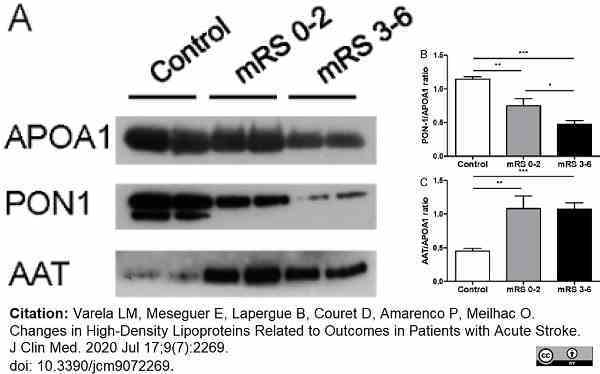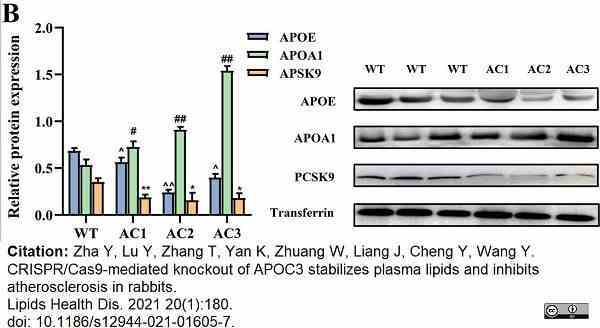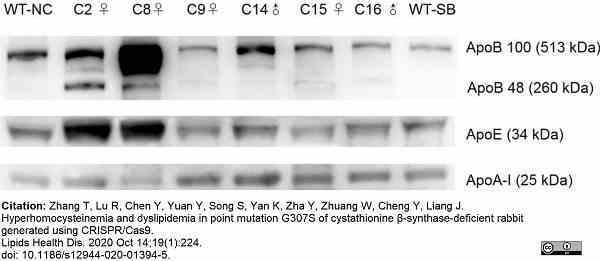Apolipoprotein A1 antibody | 1C5 (G2)



Mouse anti Human Apolipoprotein A1
- Product Type
- Monoclonal Antibody
- Clone
- 1C5 (G2)
- Isotype
- IgG1
- Specificity
- Apolipoprotein A1
| Mouse anti Human apolipoprotein A1, clone G2 recognizes Apolipoprotein A-1 (also known as Apo-A1) , a lipid-binding protein which enables the transport of dietary lipids for storage, metabolism and secretion. Apo-A1 plays an important part in the removal of cholesterol from cells. Mouse anti Human apolipoprotein A1, clone G2 reacts with both free human Apo-A1 and High Density Lipoprotein (HDL) bearing Apo-A1, but does not cross-react with ApoE, ApoB or albumin. |
- Target Species
- Human
- Product Form
- Purified IgG - lyophilized
- Reconstitution
- Reconstitute with 1.0ml distilled water
Care should be taken during reconstitution as the protein may appear as a film at the bottom of the vial. Bio-Rad recommend that the vial is gently mixed after reconstitution. - Preparation
- Purified IgG prepared by affinity chromatography on Protein A from ascites
- Buffer Solution
- 0.01M Sodium Phosphate
0.01M Sodium Borate
0.15M Sodium Chloride - Preservative Stabilisers
- 1% Dextran
1% Mannitol - Immunogen
- Native Apolipoprotein-A1 from human plasma
- Regulatory
- For research purposes only
- Guarantee
- Guaranteed until date of expiry. Please see product label.
After reconstitution store at -20oC.
Storage in frost-free freezers is not recommended. Avoid repeated freezing and thawing as this may denature the antibody.
| Application Name | Verified | Min Dilution | Max Dilution |
|---|---|---|---|
| ELISA | 1/5000 | ||
| Immunohistology - Frozen | 1/40 | ||
| Western Blotting |
- ELISA
- This antibody is suitable for coating microtitre plates in a sandwich ELISA using catalogue number 0650-0190 for detection.
References for Apolipoprotein A1 antibody
-
Derbali, H. et al. (2010) Increased biglycan in aortic valve stenosis leads to the overexpression of phospholipid transfer protein via Toll-like receptor 2.
Am J Pathol. 176: 2638-45. -
Mogilenko, D.A. et al. (2012) Endogenous apolipoprotein A-I stabilizes ATP-binding cassette transporter A1 and modulates Toll-like receptor 4 signaling in human macrophages.
FASEB J. 26: 2019-30. -
Berge, K.E. et al. (2014) Type 1 hyperlipoproteinemia due to a novel deletion of exons 3 and 4 in the GPIHBP1 gene.
Atherosclerosis. 234 (1): 30-3. -
Pingitore, P. et al. (2016) Identification and characterization of two novel mutations in the LPL gene causing type I hyperlipoproteinemia.
J Clin Lipidol. 10 (4): 816-23. -
Shavva, V.S. et al. (2016) PPARγ Represses Apolipoprotein A-I Gene but Impedes TNFα-Mediated ApoA-I Downregulation in HepG2 Cells.
J Cell Biochem. 117 (9): 2010-22. -
Shavva, V.S. et al. (2018) Tumor necrosis factor α stimulates endogenous apolipoprotein A-I expression and secretion by human monocytes and macrophages: role of MAP-kinases, NF-κB, and nuclear receptors PPARα and LXRs.
Mol Cell Biochem. 448 (1-2): 211-223. -
Botta, M. et al. (2019) Deciphering the role of V200A and N291S mutations leading to LPL deficiency.
Atherosclerosis. 282: 45-51. -
Varela, L.M. et al. (2020) Changes in High-Density Lipoproteins Related to Outcomes in Patients with Acute Stroke.
J Clin Med. 9 (7): 2269.
View The Latest Product References
-
Zha, Y. et al. (2021) CRISPR/Cas9-mediated knockout of APOC3 stabilizes plasma lipids and inhibits atherosclerosis in rabbits.
Lipids Health Dis. 20 (1): 180. -
Zhang, T. et al. (2020) Hyperhomocysteinemia and dyslipidemia in point mutation G307S of cystathionine β-synthase-deficient rabbit generated using CRISPR/Cas9.
Lipids Health Dis. 19 (1): 224.
- RRID
- AB_620040
- UniProt
- P02647
- Entrez Gene
- APOA1
- GO Terms
- GO:0005886 plasma membrane
- GO:0001540 beta-amyloid binding
- GO:0002576 platelet degranulation
- GO:0002740 negative regulation of cytokine secretion involved in immune response
- GO:0005543 phospholipid binding
- GO:0005788 endoplasmic reticulum lumen
- GO:0030141 stored secretory granule
- GO:0030139 endocytic vesicle
- GO:0006656 phosphatidylcholine biosynthetic process
- View More GO Terms
- GO:0007186 G-protein coupled receptor protein signaling pathway
- GO:0042802 identical protein binding
- GO:0010873 positive regulation of cholesterol esterification
- GO:0010903 negative regulation of very-low-density lipoprotein particle remodeling
- GO:0015485 cholesterol binding
- GO:0050821 protein stabilization
- GO:0017127 cholesterol transporter activity
- GO:0019899 enzyme binding
- GO:0030168 platelet activation
- GO:0032488 Cdc42 protein signal transduction
- GO:0033344 cholesterol efflux
- GO:0033700 phospholipid efflux
- GO:0034191 apolipoprotein A-I receptor binding
- GO:0034361 very-low-density lipoprotein particle
- GO:0034366 spherical high-density lipoprotein particle
- GO:0034375 high-density lipoprotein particle remodeling
- GO:0034380 high-density lipoprotein particle assembly
- GO:0034384 high-density lipoprotein particle clearance
- GO:0042632 cholesterol homeostasis
- GO:0043691 reverse cholesterol transport
- GO:0050713 negative regulation of interleukin-1 beta secretion
- GO:0051345 positive regulation of hydrolase activity
- GO:0060228 phosphatidylcholine-sterol O-acyltransferase activator activity
- GO:0070508 cholesterol import
- GO:0070653 high-density lipoprotein particle receptor binding
Please Note: All Products are "FOR RESEARCH PURPOSES ONLY"
View all Anti-Human ProductsAlways be the first to know.
When we launch new products and resources to help you achieve more in the lab.
Yes, sign me up

